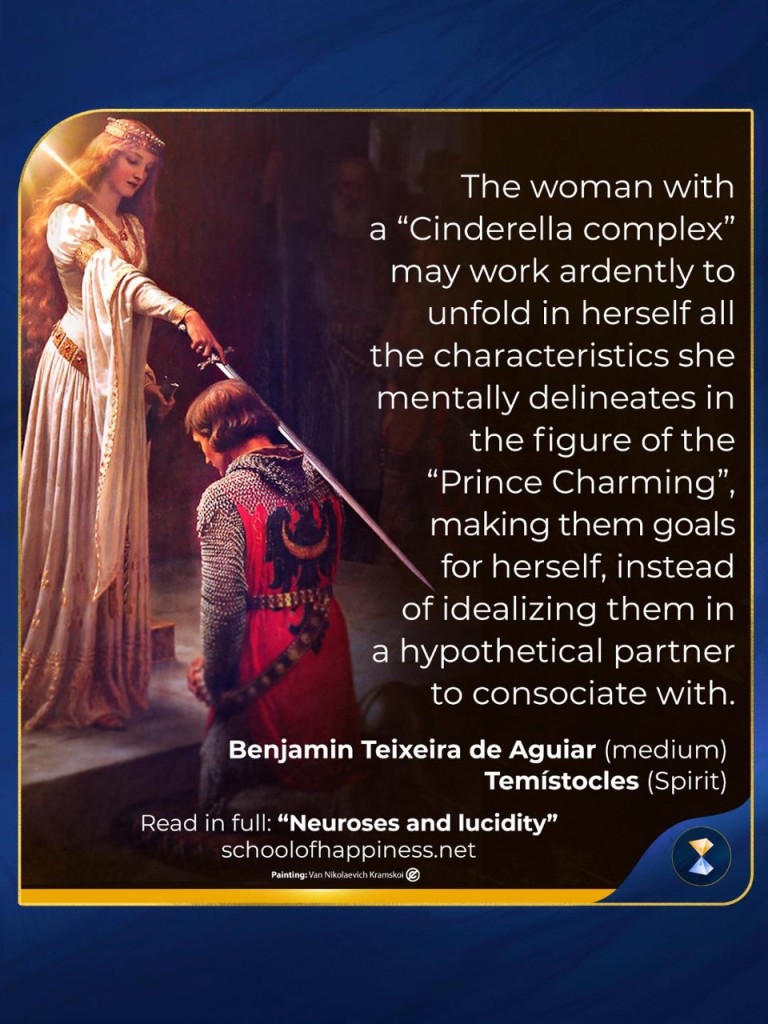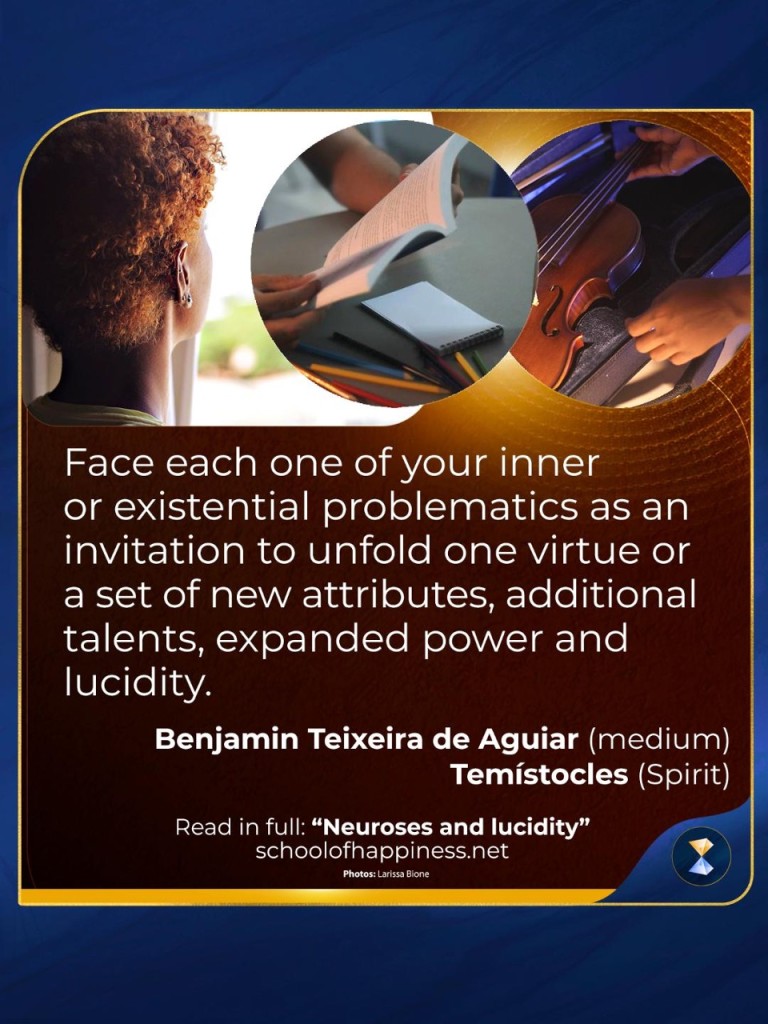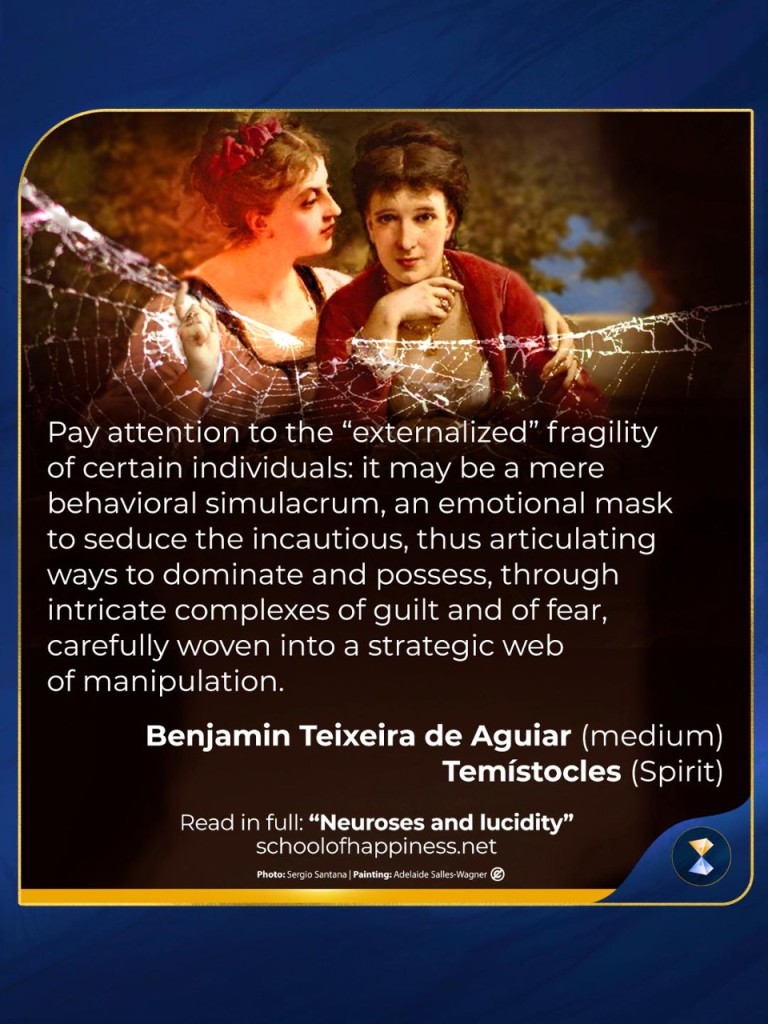Benjamin Teixeira
by the Spirit Temístocles
Neuroses – or disorders, according to the modern vernacular of psychology on the physical plane — make up complex systems of maintenance and regulation of the psychism, according to the individual’s own needs, very often of a compensatory nature. For instance: people who were attacked in their self-esteem as children may develop a sense of personal excellence, which leads them to arrogance and presumption; or, in the opposite way, according to very personal characteristics, they may develop a projection of power, in a close or distant idol, with whom they identify on a pre- conscious or unconscious level, as in the case of the “women-Cinderella” who await the arrival of the “man-god-savior-solver-of-all-problems” or in the case of fans who idolize celebrities.
The psychological archetypes (allow the apparent pleonasm), however, can be an excellent and effective alternative to socio-cultural stereotypes (this is the reason for the previous pleonasm — to justify the use of the adjectives for stereotypes, distinguishing its origin and nature in comparison with archetypes), such as that of the “arrogant guy” or the “idiot Cinderella”. Trying to elaborate one’s own problems and shortcomings with compensatory realizations and functions, with services rendered to the community, is a magnificent way of resolving one’s own intimate pending issues. God does not allow disturbances without creative purposes. Therefore, face each one of your inner or existential problematics as an invitation to unfold one virtue or a set of new attributes, additional talents, expanded power and lucidity.
In this sense, those who feel “very sure” of themselves and, at the same time, have realized their reverse of unconscious low self-esteem, as much as the diametrically opposite psychotype: of the person with an inferiority complex at the conscious level, who has already connected to their sense of their unconscious arrogance, can transfer their sense of low self-worth to a sense of reverence and recognition of the Divine power, and project his/her emotional counterpart of overconfidence in God, thus serving Him-Her, in the person of their brothers and sisters in humanity, thereby embracing both sides of the neurotic “inferiority-superiority” coin, a psychic binomial, as there are in fact so many in the structures of the human mind. The two poles begin to act in cooperation, constructively, and both at the conscious level, which is the path of psychological integration sought by all psychotherapeutic schools, because the individual recognizes/acknowledges/accepts his/her own inferiority, and, simultaneously, experiences the compensatory impulse of the superiority-savior, in the image and Person of God. Now, the woman with the “Cinderella complex” may work ardently to unfold in herself all the characteristics that she mentally delineates in the figure of the “Prince Charming”, making them goals for herself, instead of idealizing them in a hypothetical partner to consociate with.
On the other hand, also be careful not to attack someone who is already very fragile. Very often, very imposing people are nothing more than inflatable-inflated balloons, with a lot of volume but no content in it other than air. Inversely, pay attention to the “externalized” fragility of certain individuals: it may be a mere behavioral simulacrum, an emotional mask to seduce the incautious, thus articulating ways to dominate and possess, through intricate complexes of guilt and of fear, carefully woven into a strategic web of manipulation.
In everything, strive to be lucid, attentive to the fact that the mind has a natural tendency to descend to atavistic levels of automatic functioning, and is therefore primitive in its judgments and reactions to the external world. Pray, meditate, observe acutely. Go to therapy, consult your spiritual counselor. Read, research, inform yourself by any means at your disposal. And, finally, question everything, mainly your certainties and victim complexes, surrendering to God and His-Her emissaries, when the intuition of the best thing to do, not postponing, however, any initiative that becomes/is urgent and necessary.
This is the path of the best lucidity, and of the smallest error.
(Text received on August 14th, 2005)



